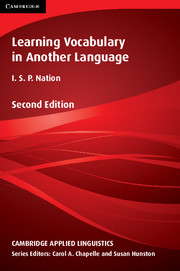Book contents
- Frontmatter
- Contents
- Series editors' preface
- Acknowledgements
- Introduction
- 1 The goals of vocabulary learning
- 2 Knowing a word
- 3 Teaching and explaining vocabulary
- 4 Vocabulary and listening and speaking
- 5 Vocabulary and reading and writing
- 6 Specialised uses of vocabulary
- 7 Vocabulary-learning strategies
- 8 Learning words from context
- 9 Word parts
- 10 Using dictionaries
- 11 Deliberate learning from word cards
- 12 Finding and learning multiword units
- 13 Testing vocabulary knowledge and use
- 14 Designing the vocabulary component of a language course
- Appendices
- Subject index
- Author index
11 - Deliberate learning from word cards
Published online by Cambridge University Press: 15 February 2018
- Frontmatter
- Contents
- Series editors' preface
- Acknowledgements
- Introduction
- 1 The goals of vocabulary learning
- 2 Knowing a word
- 3 Teaching and explaining vocabulary
- 4 Vocabulary and listening and speaking
- 5 Vocabulary and reading and writing
- 6 Specialised uses of vocabulary
- 7 Vocabulary-learning strategies
- 8 Learning words from context
- 9 Word parts
- 10 Using dictionaries
- 11 Deliberate learning from word cards
- 12 Finding and learning multiword units
- 13 Testing vocabulary knowledge and use
- 14 Designing the vocabulary component of a language course
- Appendices
- Subject index
- Author index
Summary
This chapter is based on the idea that research has shown the deliberate learning of vocabulary to be such an efficient and effective way of learning that, in terms of speed of vocabulary growth, a course which includes both incidental learning from message-focused activities and deliberate learning will be much better than one that relies only on incidental learning. Deliberately learning vocabulary before it is met in message-focused activities means that such activities will be less difficult to do. Deliberately learning vocabulary after it has been met in a message-focused activity means that deliberate learning will be more meaningful and motivated.
The term ‘learning from word cards’ will be used to describe the formation of associations between a foreign language word form (written or spoken) and its meaning (often in the form of a first language translation, although it could be a second language definition or a picture or a real object, for example). This term has been deliberately chosen to connect this kind of learning with a strategy and to avoid the confusion of other terms such as ‘list learning’ (Griffin and Harley, 1996), ‘paired associate learning’ (Carroll, 1963; Higa, 1965), and ‘learning word pairs’ (Nation, 1982). As we shall see, list learning is not a desirable strategy if the order of the items in the list cannot easily be changed. Paired associates, referring to the association between form and meaning, is not a very transparent term, and word pairs wrongly implies that the meaning has to be expressed as a single word.
- Type
- Chapter
- Information
- Learning Vocabulary in Another Language , pp. 437 - 478Publisher: Cambridge University PressPrint publication year: 2013



